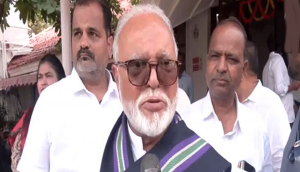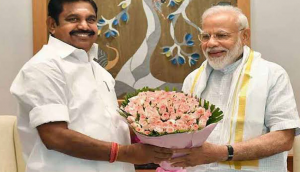What the J&K chief secy's resignation tells us about the PDP-BJP coalition

The bureaucrat
- On 25 August, J&K chief secretary Iqbal Khandey resigned dramatically
- This further feeds the rumours of J&K bureaucrats being unhappy with the PDP-BJP govt
- Khandey was resentful of being overlooked in the decision-making process
- He was never an easy person to work with, but replacing him may be a trickier job still
The strife
- Bureaucrats argue that the current government does little
- Bureaucratic transfers made in the first month of the govt (March) were reversed by the third
- Officials returning from top positions in the Centre found themselves in inconsequential posts
The replacements
- Though Khandey\'s resignations is yet to be accepted, replacements have been lined up
- Five candidates for the position have thrown their hats into the ring
- It\'ll be worth watching who the govt picks. They\'ll have to find a candidate who pleases both
On 25 August, J&K chief secretary Iqbal Khandey dramatically resigned from his job, lending credence to rumours that the PDP-BJP government was having trouble handling its bureaucrats.
Khandey, a 1978-batch IAS officer, was reportedly resentful that his office was being passed over in important administrative and policy decisions.
The cabinet meeting on 21 August seemed to have been the last straw. Busy with mourning rituals over a close kin's death, Khandey had sought the postponement of the meeting. But the meeting was held anyway with another senior bureaucrat, BR Sharma, standing in for Khandey.
This marks the first time a chief secretary has resigned in J&K over differences with the state government. In 2008, BR Kundal had also put in his papers, but this was done at the urging of then-Chief Minister Ghulam Nabi Azad, who wanted him to join the Congress.
Khandey's resignation has, of course, attracted media attention. It doesn't create a crisis or a vacuum in J&K's democracy, but it does not reflect well on the already struggling coalition government.
Sketchy past
As bureaucratic reputations go, Khandey was something of 'a man of extremes'. He was known for his competence and integrity, but in 2006, he was arrested for his involvement in the infamous Srinagar sex scandal involving senior politicians, top bureaucrats, police officers and some prominent civil society members.
He was later acquitted by the courts, paving the way for him becoming the state's third Muslim chief secretary. It was still a tough call for the NC-Congress coalition to make him the state's top bureaucrat in 2011.
Ever since the PDP-BJP coalition took over in March, Khandey has had difficulty getting along with the government, to the surprise of many in the Valley. Khandey was always seen as being close to the PDP.
In Mufti Mohammad Sayeed's previous term as CM, Khandey was his principal secretary. In the 2008 Assembly polls, Khandey's young daughter Sehar Iqbal had contested unsuccessfully on a PDP ticket; she has since quit the party.
This long association seemed to have been of little consequence in Khandey's role as chief secretary in the PDP-led coalition. But in his resignation, Khandey has helped shine spotlight on the wobbly functioning of the state government and its relationship with its bureaucracy.
Tension in the bureaucracy
Insiders speak of the new coalition, with its many first-timers struggling to rally the bureaucracy around them and, in a rush to show dramatic results, trying to work without them.
One major example was the transfer of the senior bureaucrats, ordered in the first month of the coalition. Most of these were reversed after three months.
Khandey was reportedly not on board with this reshuffle, which was apparently enforced more on the recommendations of ministers, without giving any thought to officers' competence for their new assignments.
This marks the first time a chief secretary has resigned in J&K over differences with the state government
Many top bureaucrats are thus frustrated with their postings, and some of them have returned from high-profile deputations at the Centre to find themselves dumped into insignificant positions.
Similarly, many bureaucrats traditionally seen as close to the PDP have been dealt the same fate, with the party getting back at them for their perceived betrayals during the NC-Congress coalition.
"This has caused letdowns, heartburns and hurt egos," said a bureaucrat, on the condition of anonymity. "There is ongoing internal strife in the system, with bureaucrats fighting small pitched battles among themselves."
To top it all, there's a turf war over controlling the bureaucracy between the PDP and the BJP, both of whom have effectively split the state between them - with the Valley going to the PDP and Jammu to the BJP.
"The PDP may not have enough say over postings in Jammu. Similarly, the BJP will exercise restraint when it comes to the Kashmir Valley," said another officer. "Together, both have created a zero-sum game."
A marriage of convenience
The coalition, goes the refrain in Kashmir, has worked out a 'governance and a political trade-off', whereby contentious issues and actions are being held up, and the government's remit is limited to a mutually agreed-upon minimum programme.
This has led to a bureaucratic dead-end: a political status quo hangs over the state, zealously guarded by both parties and purveyed as their respective achievements.
The PDP is happy that it has forced the BJP to stall its plan to revoke Article 370 and go silent on contentious issues like separate enclaves for Kashmiri Pandits. The BJP is content with the fact it has curbed an allegedly soft-separatist party with a self-rule agenda for the state.
Possible replacements
The state government may have yet to take a call on Khandey's resignation, but in the meantime, jockeying for the appointment has already begun.
BR Sharma, Financial Commissioner (Planning), is widely tipped to take over as the new chief secretary. But he is not the senior-most bureaucrat, with four others before him - Financial Commissioner (Revenue) Arun Kumar; his wife Sonali Kumar, chairperson of the Special Tribunal; Financial Commissioner (Industries) Khurshid Ganai; and AK Angurana, who is on deputation to the Centre.
All have thrown their hats into the ring, with some of them privately threatening to oppose should Sharma take over.
However, the fact that Sharma was a consensus candidate for the coalition partners may work in his favour. Besides, he hails from Billawar in Jammu, which would make it difficult for the BJP to oppose his appointment.
Sharma also has the time on his side, with four years left to retire. Arun Kumar is the most senior and has around one-and-a-half years left before his retirement. The others are due to retire in the next six months.
While the most senior, Kumar has a disadvantage because he is largely deemed responsible for provoking the 2008 Amarnath land row. This makes him a politically undesirable choice for PDP, whose core constituency is in the Valley.
But what about the BJP, which supports the transfer of the land to the shrine board? All the more now, when Kumar's credentials should carry favour with the party. But the easier and electorally more gainful option would be Sharma, with his Jammu background, as opposed to Kumar, who hails from Bihar.
It will be a tough call, either way, for the alliance.
First published: 28 August 2015, 12:27 IST






![BJP's Kapil Mishra recreates Shankar Mahadevan’s ‘Breathless’ song to highlight Delhi pollution [WATCH] BJP's Kapil Mishra recreates Shankar Mahadevan’s ‘Breathless’ song to highlight Delhi pollution [WATCH]](https://images.catchnews.com/upload/2022/11/03/kapil-mishra_240884_300x172.png)

![Anupam Kher shares pictures of his toned body on 67th birthday [MUST SEE] Anupam Kher shares pictures of his toned body on 67th birthday [MUST SEE]](https://images.catchnews.com/upload/2022/03/07/Anupam_kher_231145_300x172.jpg)






